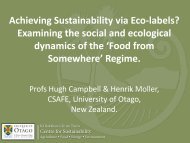Book of Abstract (incl. addendum) - IFSA symposium 2012
Book of Abstract (incl. addendum) - IFSA symposium 2012
Book of Abstract (incl. addendum) - IFSA symposium 2012
You also want an ePaper? Increase the reach of your titles
YUMPU automatically turns print PDFs into web optimized ePapers that Google loves.
Workshop 1.3 Understanding agricultural structural changes and their impacts, to support<br />
<strong>incl</strong>usive policy dialogue and formulation<br />
watershed scale (7 km²) in terms <strong>of</strong> both changes in farming systems and effects on run<strong>of</strong>f. Finally, the<br />
economic evaluation <strong>of</strong> additional costs <strong>of</strong> StopMilkEnv was extrapolated at the level <strong>of</strong> the<br />
Austreberthe watershed syndicate 1 (214 km²). Our results show that StopMilk leads to a significant<br />
increase in run<strong>of</strong>f, whereas the local public-action program proposed with StopMilkEnv reduces run<strong>of</strong>f<br />
below the 2007 level. The willingness to pay <strong>of</strong> the residents <strong>of</strong> the Austreberthe watershed for a 5<br />
years program was around €395,000/year and a comparison with the cost <strong>of</strong> the environmental-friendly<br />
cultivation techniques revealed that the funding <strong>of</strong> such practices would be possible but would require<br />
borrowing by the community.<br />
How to design a pro-poor payments for environmental services (PES)<br />
mechanism in the forest frontier? Lessons from action research in<br />
Madagascar<br />
Aurelie Toillier and G. Serpantié<br />
CIRAD, France<br />
Aurelie.Toillier@cirad.fr<br />
PES are considered new incentive tools for managing both the environment and rural development in<br />
developing countries. However, designing mechanisms tailored to smallholder characteristics and rural<br />
development requirements remains a challenge, particularly in tropical countries where the forest<br />
sector is characterized by long-standing patterns <strong>of</strong> inequality and poverty. In order to switch from<br />
theoretical principles to a really innovative management tool addressing local issues, we argue that it is<br />
necessary to <strong>incl</strong>ude as from the beginning the characteristics <strong>of</strong> agricultural dynamics, and to involve<br />
local stakeholders in co-designing the ES and in solving problems encountered in their delivery.<br />
Through an action-research framework, we explored the characteristics <strong>of</strong> a “pro-poor” watershedbased<br />
PES mechanism associated with a hydropower project. The study site is located in the<br />
agricultural frontier <strong>of</strong> a rainforest in eastern Madagascar. We built a local and <strong>incl</strong>usive knowledge<br />
system based on (1) local and scientific knowledge on the relationships between land use and water<br />
services, (2) stakeholder perceptions on the electrification project, and (3) the heterogeneity <strong>of</strong><br />
livelihoods <strong>of</strong> targeted households. We were then able to clarify what the environmental service and<br />
governance scheme could be. The main results show the necessity <strong>of</strong> going beyond economic and<br />
hydrologic rationales that usually underlie watershed-based PES development. In conclusion, we point<br />
out the main elements that underlined the design <strong>of</strong> a pro-poor PES scheme able to accompany or<br />
promote the changes that are advisable for agriculture in the forest frontier.<br />
1 A watershed management syndicate is an organizational management structure in France, spanning several<br />
communes, that manages all matters relating to water erosion and its consequences within its geographical ambit.<br />
37











